Marrakesh, Morocco: A Complete Survival Guide
Only the most intrepid traveller fails to be at least a little daunted by Marrakesh, Morocco's fourth largest and most befuddling city. It comes in a rush that can dazzle and confuse polite Westerners in an instant.
Indeed, some find the city a little too much to deal with – as I did following my visit to the comparatively sleepy city of Essaouira on the coast. But overcoming the challenges presented by Marrakesh is worth the effort; few cities are so intoxicating. Meandering through the city's network of ancient souks is impossible to forget: men in flowing hooded robes; wrinkled panhandlers in dark corners; scooters careering over rough cobbles; atmospheric prayer-calls; stalls selling such disparate wares as silver teapots, sheep, bizarre fruits and heaps of hay for the city's overworked donkeys. Life, in most of its guises, is alive and (reasonably) well on the streets of Marrakesh.
This is the kind of article I should have read before I arrived.
Google Maps
Although I came rather late to the smartphone party, I have found Google Maps to be invaluable on many of my trips. But in Marrakesh this little app came into its own. Be sure to load up a map of the city before you arrive – making sure you zoom in on as many alleys in the medina (old town) as you can for later offline use. You'll be glad you did.
After a day of exploring the labyrinthine medina, with its seemingly endless winding alleys and dead ends, I felt as if I was coming close to understanding its basic geography; but on the occasion my phone's battery ran out, I discovered this confidence was based entirely on Google Maps access. Of course, Windows and Apple also have map apps, but from my own experience and as far as I could tell from other travellers, Google has the most detailed maps and most intuitive interface.
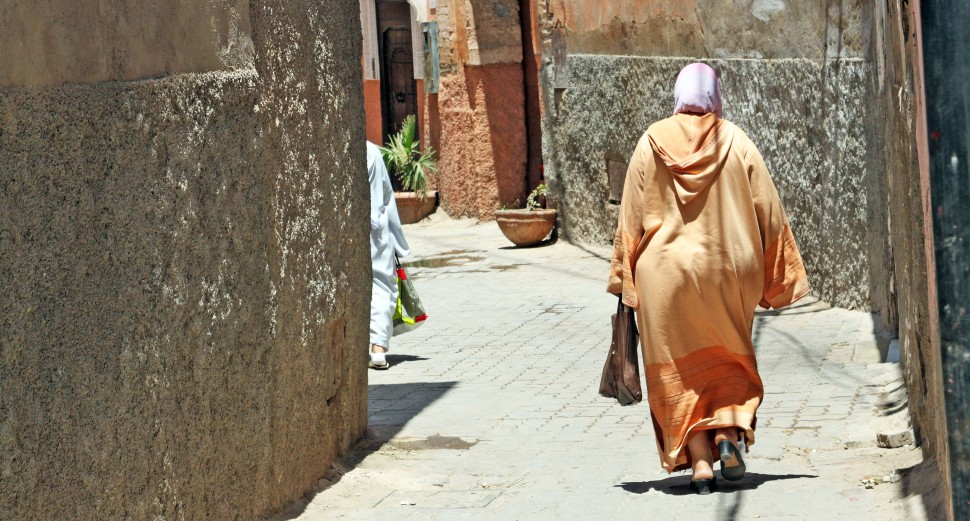
If you plan to use an old-fashioned paper map, then you'll need more directional sense than a racing pigeon – and a lot of luck!
Choose a central hotel
If you get lost easily or don't like dark alleys, then choose a hotel close to the medina's main square – Jemaa el-Fnaa – where you'll probably spend a lot of your time. Equally, if you like to be out late, choose a hotel near one of the landmarks or on a busy main road so you can find it again easily.
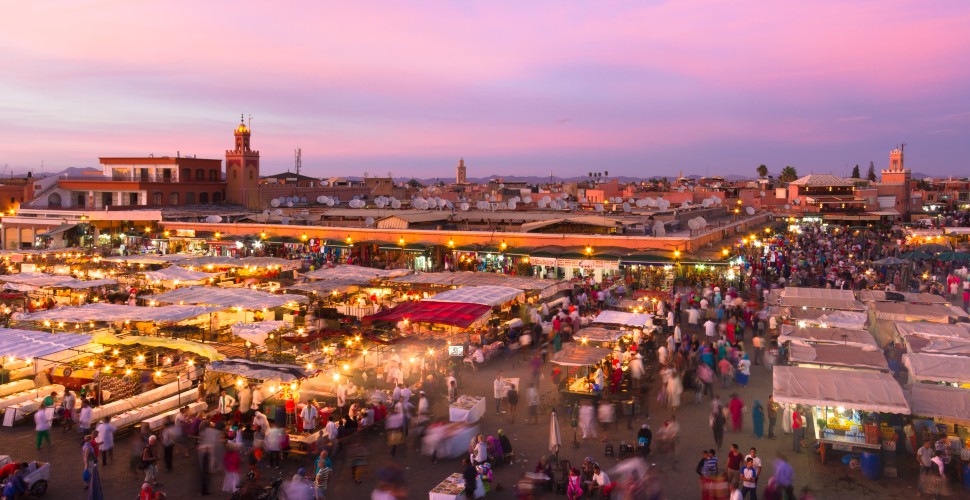
Taxi
If you do get lost, you can always go by taxi. Don't pay more than 50 dirhams (£3.30) for destinations in and around the medina.
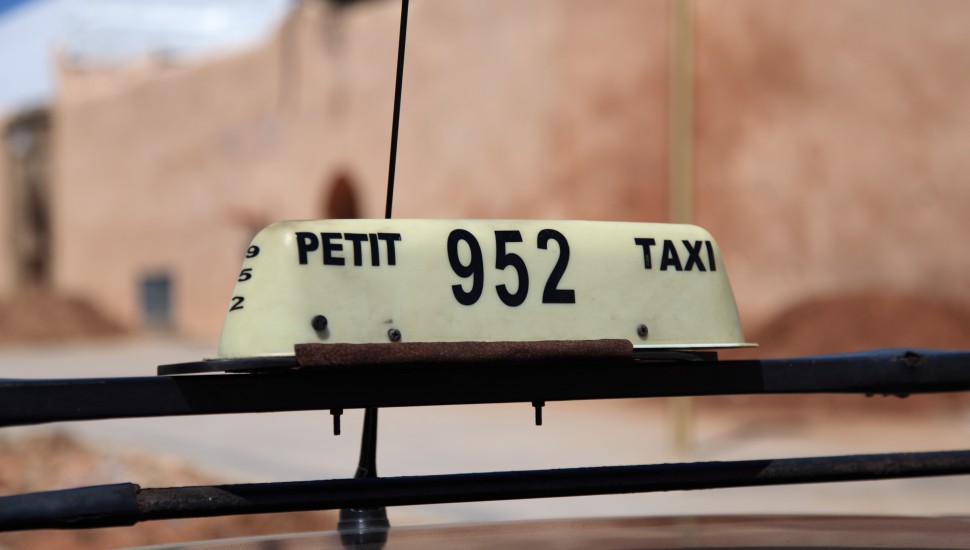
Fibbers
After your first day, you'll be certain Marrakesh is jam-packed with twinkly-eyed fibbers. They generally occupy the souks but can be found across the medina. Laden with luggage you'll be of special interest to them. They'll ask you the name of your hotel and guide you to it, then ask for money. Of course this can be of great use if you're lost (or don't have Google Maps). But don't tip more than 20 dirhams (£1.30), even if they ask for more – which they will.
When I arrived at Jemaa el-Fnaa I used my phone to find my hotel. But a young man appeared at my side asking the name of my accommodation. Unwisely (perhaps because of that Western politeness) I told him and despite the fact that Google Maps was guiding me, he accompanied me to the hotel lobby and expected some kind of tip for his effort. I didn't pay, but he loitered with a touch of menace throughout the check-in process, a fact to which the concierge was apparently oblivious.
If you don't want such ‘guidance', then do not tell anyone the name of your hotel!
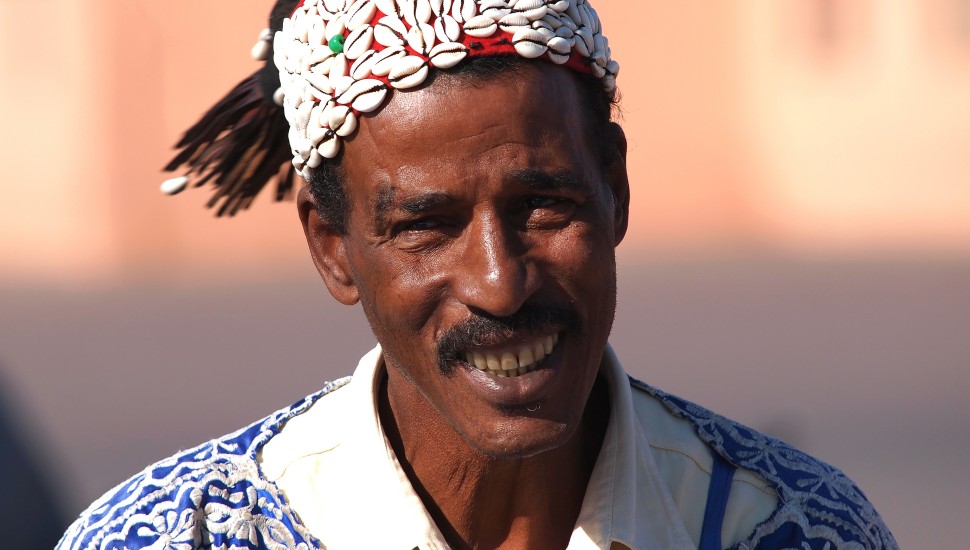
“Excuse me, it's Closed!”
In the souks you'll encounter more fibbers. These young men tell you that the alley ahead is closed (even though it is full of people), or that you are going the wrong way. They can be very persuasive, but they are lying. They want you to lose your way so that they can help you get to your destination or to your hotel. Or they may wish to corral you into an associate's shop, or to guide you to the famous hide tanning areas. Wherever they take you, they will want a tip. Just try to ignore them and carry on with your route.
After a day or two you get used to these incessant attempts at misdirection.
Crime
As with all big cities, it is possible to be robbed or pickpocketed in Marrakesh. But the medina is generally so busy that you'll never be ‘alone down a dark alley'. Even late at night, women, children and the elderly are out in the souks – shopping and enjoying themselves. This creates a calm, civil and safe atmosphere.
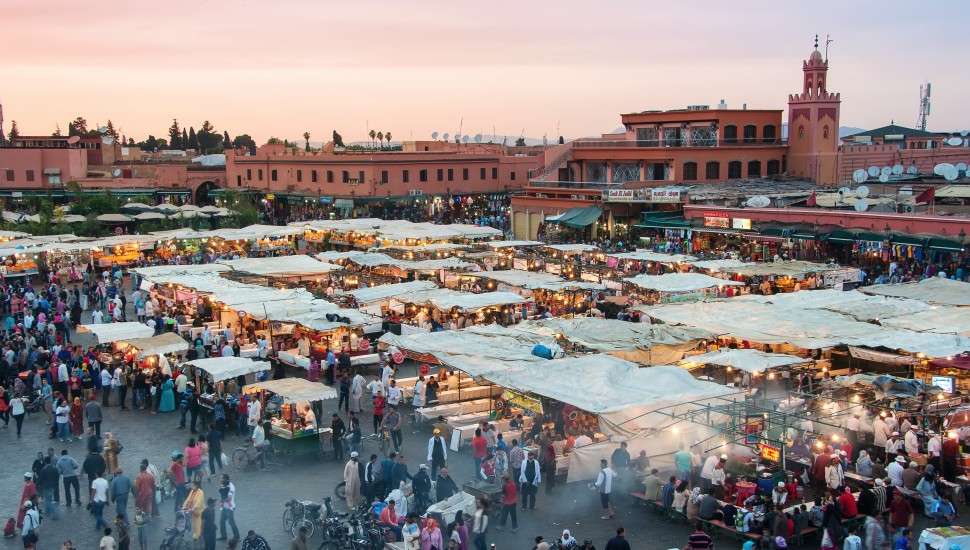 (Jamaa el Fna, Marrakesh, Morocco (Madrugada Verde/Bigstock.com)
(Jamaa el Fna, Marrakesh, Morocco (Madrugada Verde/Bigstock.com)
Hashish
I was offered this ubiquitous North African consumable on many occasions – apparently as a single male traveller I was in the target demographic. The most effective way of getting dealers to leave you alone is to say ‘I don't smoke' – which rules out any ambiguity. Anyone caught by the police with hashish will need to pay a large fine to preclude proceedings of a far more serious nature.
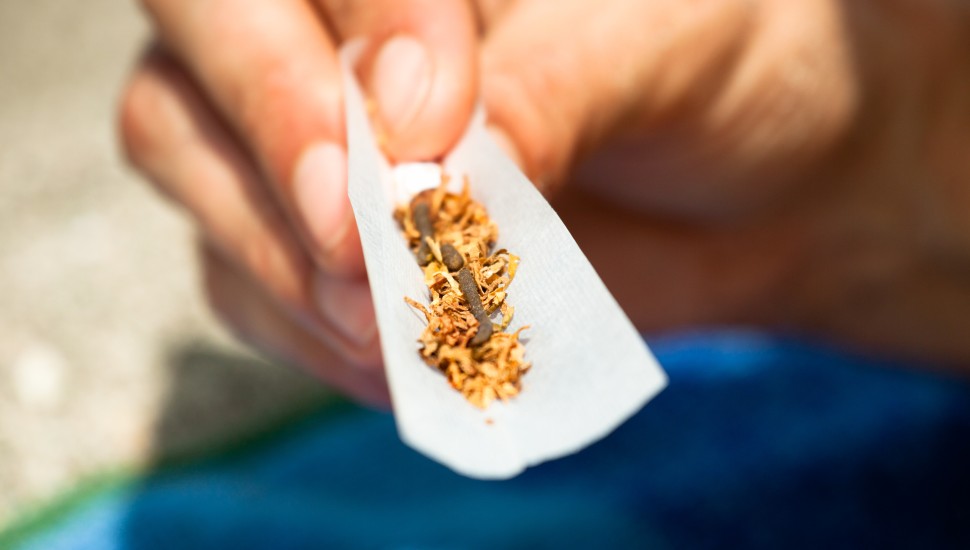
Haggling
Marrakesh could be the spiritual home of haggling. Be sure to play the game, or you will find yourself seriously out of pocket. A vendor's opening price is generally four times what it should be, so bargain hard!
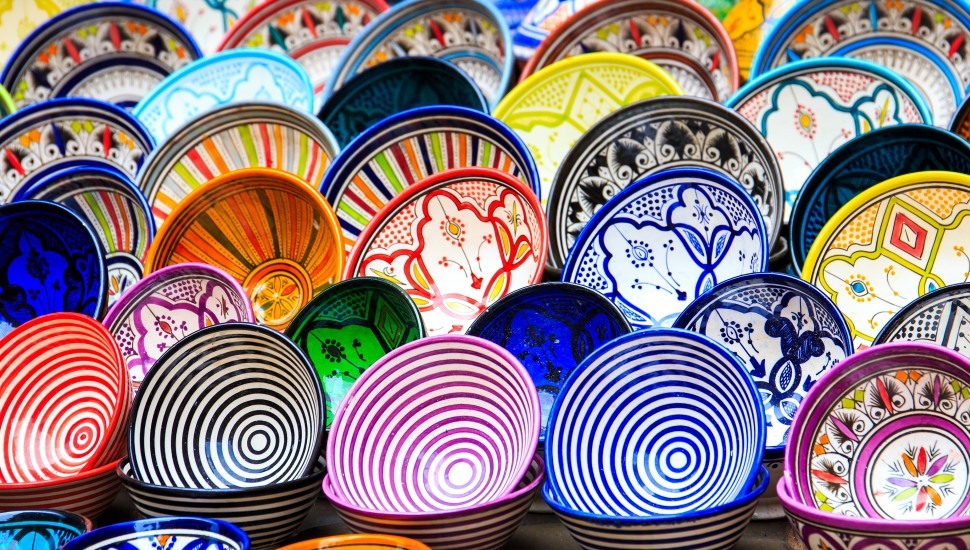
Learn some French
The majority of Moroccans speak both Arabic and French (the latter because it was once a French protectorate). Learning (or re-learning!) a little French will be of great use and will be appreciated by your hosts. At the very least, try to pick up one to a hundred (important for haggling and avoiding being swindled), along with ‘bonjour' (hello), ‘sil vous plait' (please) and ‘merci' (thank you).
Henna Tattoos
Numerous old ladies in Jemma-el-Fnaa offer henna tattoos. Some may try to grab your hand and begin a tattoo without asking. If you let them continue they may demand payment many times greater than the going rate. If you do want a henna tattoo, be sure to write down the price so there are no misunderstandings.
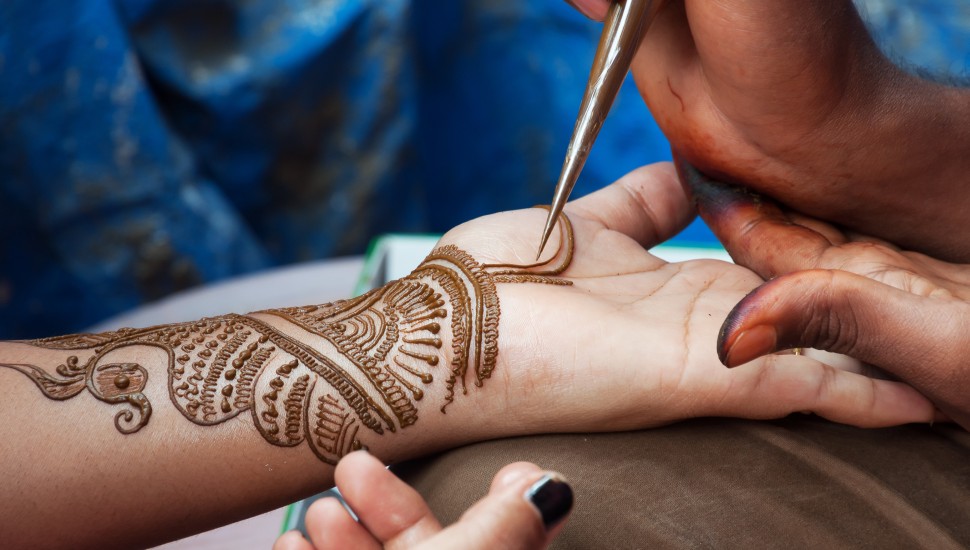
Hair-cut and shave
Before my arrival in Marrakesh I visited a barber in Essaouira. Here I asked the price for a haircut and a shave; I was sure the man said 50 for a haircut and 50 for a shave. But after giving me a Moroccan shearing in record time, he asked for 150. Eventually I paid up, because I wasn't 100 per cent sure I had clarified the price. However, I felt cheated. Later I read about the ‘write the price down first' tip. So once again, write down the price of any service before it is provided.
Eating
Local cuisine is heavily focussed on tajine (a kind of stew cooked and served in an earthenware pot) and couscous. Alongside these two Moroccan classics, most menus vary little, offering omelettes, pizzas and sandwiches. Kebabs, falafel and hummus are more common in fast food establishments, although are usually of very high quality. Olives and bread are served with most meals. There are plenty of vegetarian options. Giving a tip of about 10 per cent is normal practice.
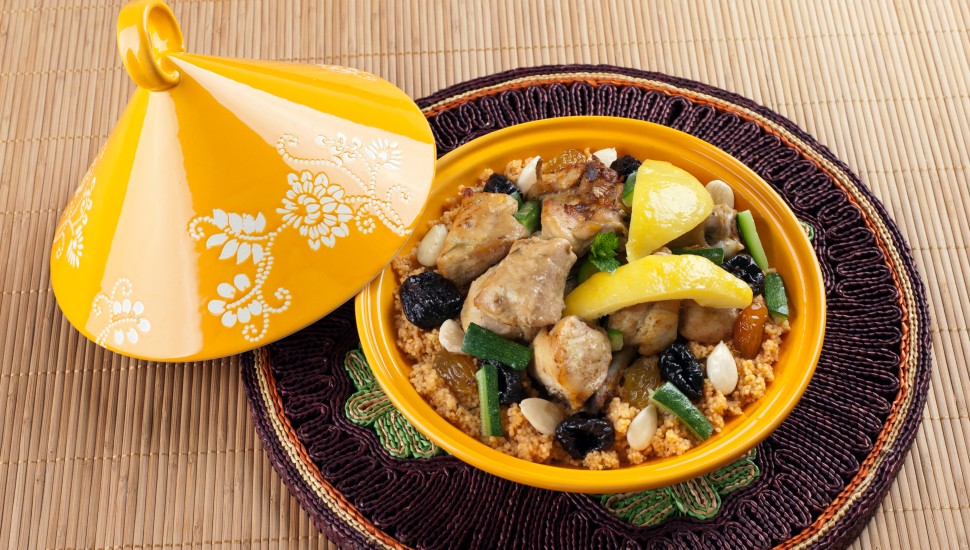
Supermarket for cheaper food
Food prices in the Medina can seem rather steep for such a poor country. If you get fed up of paying over the odds for your meals, either walk away from the centre where prices drop dramatically, or visit the local Carrefour supermarket, where you can buy provisions for much less. Carrefour is a 20 minute walk west of the medina.
Alcohol
Every time I asked a restaurant if they sold beer, the reply came: “Not in the medina, you have to go outside.” But after a little TripAdvisor research I found several places inside the old quarter happy to sell all manner of alcoholic drinks. With a friend I sought out a place called Café Arabe, which sold the local Flag beer, as well as Heineken, red and white wines and a wide selection of spirits. After hearing very few UK accents in Marrakesh, I was suddenly surrounded by them in Arabe! 35 dirhams (£2.35) for a very small Flag beer, rising to 90 dirhams (£6) for a Scotch. Great evening views towards Jemaa-al-Fnaa.
Tipping
Who to tip? How much to tip? Stressful but important questions. Low-paid hotel maids really appreciate a tip. 100 dirhams for a week's stay would elicit a grateful smile. Taxi drivers will probably fail to put their meters on when they see your foreign face, so will have given themselves a tip already. Tipping people who work in bars and restaurants is normal, as is someone who has helped you find your destination (but see above Fibbers section).
What to Wear
As a devout Muslim country, it's important to dress appropriately. Women should dress modestly, with shorts or skirts below the knee and avoid bare shoulders. Men should avoid wearing singlets; normal t-shirts and knee-length shorts are acceptable. Dressing immodestly is unlikely to have any serious ramifications, but it is best to respect local conventions. I recall one western girl walking the souks in a very brief skirt, watching every male head turn in her wake.
Enjoy!
Overcoming the challenges presented by Marrakesh can feel great: there's nothing quite like wandering fearlessly through this ancient North African city!
Get a Quote